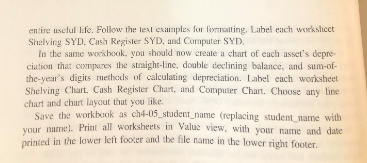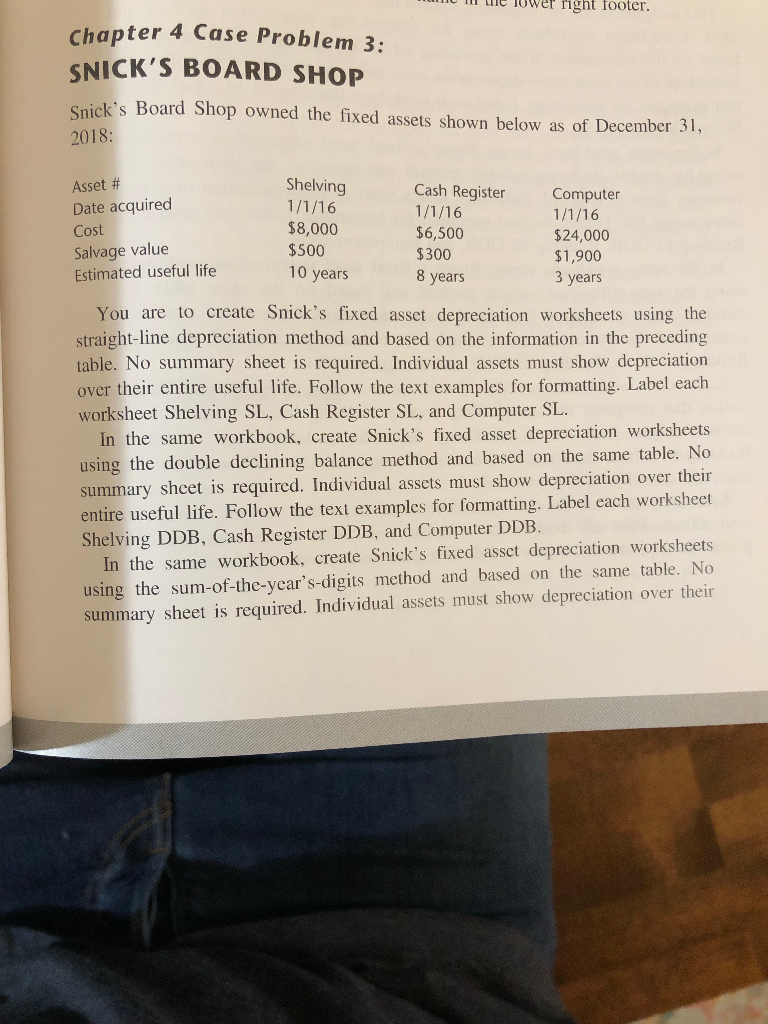Question
You are to create Snick's fixed asset depreciation worksheets using the straight-line depreciation method and based on the information in the preceding table. No Summary


You are to create Snick's fixed asset depreciation worksheets using the straight-line depreciation method and based on the information in the preceding table. No Summary Sheet is required. Individual assets must show depreciation over their entire useful life. Follow the trext examples for formatting. Label each worksheet Shelving SL, Cash Register SL, and Computer SL. In the same workbook, create Snick's fixed asset depreciation worksheets using the double declining balance method and based on the same table. No summary sheet is required. Individual assets must show depreciation over their entire useful life. Follow the text examples for formatting. Label each worksheet Shelving DDB, Cash Register DDB, and Computer DDB. In the same workbook, create Snick's fixed asset depreciation worksheets using the sum-of-the-year's-digits method and based on the same table. No summary sheet is required. Individual assets must show depreciation over their entire useful life. Follow the test examples for formatting. Label each worksheet Shelving SYD, Cash Register SYD, and Computer SYD. In the same workbook, you should now create a chart of each asset's depreciation that compares the straight-line, double declining balance, and sum-of-the-year's digits methods of calculating depreciation. Label each worksheet Shelving Chart, Cash Register Chart, and Computer Chart. Choose any line chart and chart layout that you like.
entire usclul lLfe. Follow the texl esauples for lomalting, Label each workshect Shelving SYD. Cish Register SYD, and Computer SYD In the same workbook. you should now create a chart of each asset's depre- ciation that compares the straight-linc, double declining balance, and sum-of- the-year's digits methods of calculating depreciation. Label each worksheet Shelving Chart. Cash Register Chart, and Computer Chart. Choose any line chart and chaurt layout that you like. Save the workbook as ch4-05 student name (replacing student name with your name. Print all worksheets in Vau view, with your name and date name. Print all worksheets in Value view, with prinied in the lower left fooker and the fle name in the lower right footer i l ie lower ight footer hapter 4 Case Problem 3: SNICK'S BOARD SHOP Snick's Board Shop owned the fixed assets shown below as of December 31, 2018: Asset # Date acquired Cost Salvage value Estimated useful life Shelving Cash Register Computer $8,000 $500 10 years $6,500 $300 8 years $24,000 $1,900 3 years You are to create Snick's fixed asset depreciation worksheets using the straight-line depreciation method and based on the information in the preceding table. No summary sheet is required. Individual assets must show depreciation over their entire useful life. Follow the text examples for formatting. Label each worksheet Shelving SL, Cash Register SL, and Computer SL. In the same workbook, create Snick's fixed asset depreciation worksheets using the double declining balance method and based on the same table. No summary shcet is required. Individual assets must show depreciation over thein entire useful life. Follow the text examples for formatting. Label each worksheet Shelving DDB, Cash Register DDB, and Computer DDB In the same workbook, create Snick's fixed assct depreciation worksheets using the sum-of-the-ycar's-digits method and based on the same table. No summary sheet is required. Individual assets must show depreciation over their entire usclul lLfe. Follow the texl esauples for lomalting, Label each workshect Shelving SYD. Cish Register SYD, and Computer SYD In the same workbook. you should now create a chart of each asset's depre- ciation that compares the straight-linc, double declining balance, and sum-of- the-year's digits methods of calculating depreciation. Label each worksheet Shelving Chart. Cash Register Chart, and Computer Chart. Choose any line chart and chaurt layout that you like. Save the workbook as ch4-05 student name (replacing student name with your name. Print all worksheets in Vau view, with your name and date name. Print all worksheets in Value view, with prinied in the lower left fooker and the fle name in the lower right footer i l ie lower ight footer hapter 4 Case Problem 3: SNICK'S BOARD SHOP Snick's Board Shop owned the fixed assets shown below as of December 31, 2018: Asset # Date acquired Cost Salvage value Estimated useful life Shelving Cash Register Computer $8,000 $500 10 years $6,500 $300 8 years $24,000 $1,900 3 years You are to create Snick's fixed asset depreciation worksheets using the straight-line depreciation method and based on the information in the preceding table. No summary sheet is required. Individual assets must show depreciation over their entire useful life. Follow the text examples for formatting. Label each worksheet Shelving SL, Cash Register SL, and Computer SL. In the same workbook, create Snick's fixed asset depreciation worksheets using the double declining balance method and based on the same table. No summary shcet is required. Individual assets must show depreciation over thein entire useful life. Follow the text examples for formatting. Label each worksheet Shelving DDB, Cash Register DDB, and Computer DDB In the same workbook, create Snick's fixed assct depreciation worksheets using the sum-of-the-ycar's-digits method and based on the same table. No summary sheet is required. Individual assets must show depreciation over theirStep by Step Solution
There are 3 Steps involved in it
Step: 1

Get Instant Access to Expert-Tailored Solutions
See step-by-step solutions with expert insights and AI powered tools for academic success
Step: 2

Step: 3

Ace Your Homework with AI
Get the answers you need in no time with our AI-driven, step-by-step assistance
Get Started


